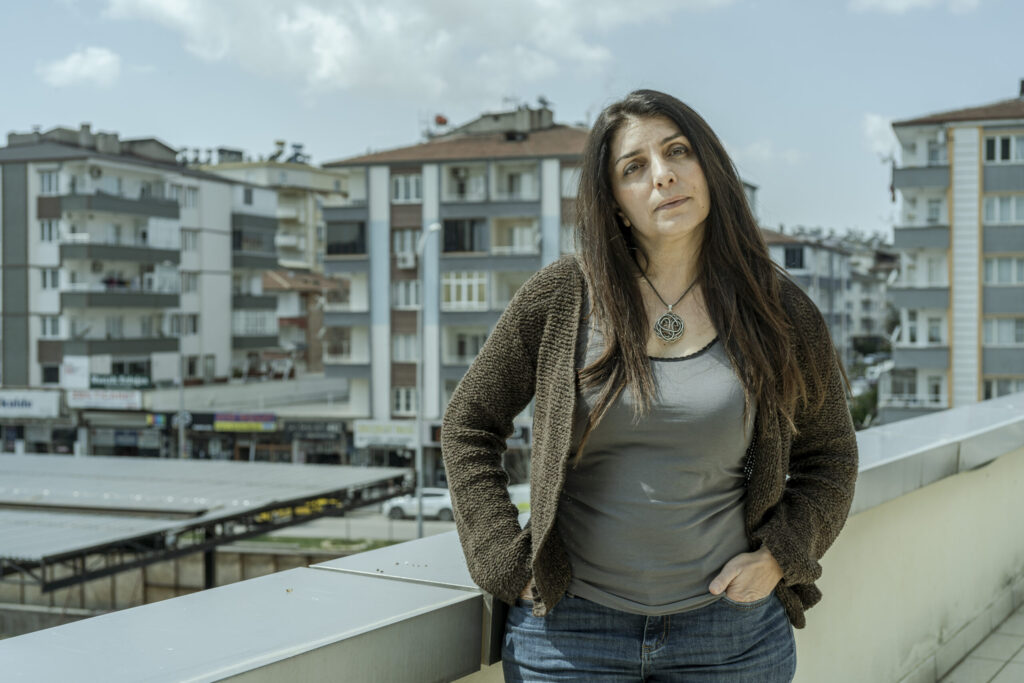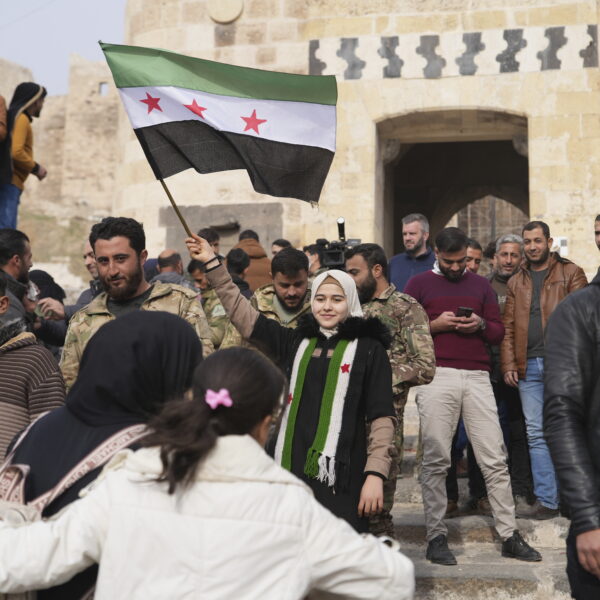“I wish I could find Syrians here to cry with,” Lina Chawaf told other fellows in the Nieman Class of 2025 as she followed the stunning developments unfolding in her country in early December.
Chawaf is the CEO and founder of Syrian independent radio station Radio Rozana, which has been operating in exile from France and Gaziantep, Turkey. She spoke to her Nieman classmates about the fast-moving series of events since the Islamist rebel group Hayat Tahrir al-Sham (HTS) took control of Damascus on Dec. 8, bringing an abrupt end to Syria’s prolonged civil war and forcing President Bashar Assad into exile in Russia after a 24-year rule.

Chawaf says Syrian journalists in the country and in exile are waiting with uncertainty to see what the new government’s approach to the media will be. The only news outlets permitted under the Assad regime were state-run, and Syria has long been classified as one of the most dangerous places in the world for journalists. During the civil war, hundreds of journalists were jailed and dozens were killed — forcing most independent outlets to operate in exile and earning Syria a second-to-last ranking in the Reporters Without Borders World Press Freedom Index.
Chawaf says her Radio Rozana colleagues are now openly reporting on the ground in Syria and hurrying to move their transmitter from Turkey to Damascus.
The conversation has been edited for length and clarity.
This moment, I never [thought I’d] see it. I was saying, “I will never see my country again free of Assad.”
We don’t know how to feel about it. We are so confused, happy, but afraid. We have been waiting for this moment for 13 years, and [half] a million Syrians died for this moment. At the same time, we didn’t want Islamists to take [power]. But maybe we didn’t have any other choice.
Syrian people, if you see the videos, all were crying from happiness … but I was [repeatedly] telling my colleague in Rozana, “We have to think what will happen after. We have to think [about] the long-term strategy.”
The terrible system of dictatorship is gone. So of course we are happy, but we have to fight another battle. It’s a different battle because the [new government] does not like us — not only us, but any independent media, since they want to oblige the media to push their propaganda. So we don’t know what will come, but today they formed the government, and all of them are men.
For us in Rozana, we are trying to keep it objective. Now there are a lot of people who feel hate and anger. … The people who suffered by Assad, they said, “We want justice.” We are afraid of civil conflict, because there are a lot of people who [want] revenge. So we have to keep the hate speech away, because it’s a circle. If they start to do it, then it will continue like this.
If you listen to Rozana now, we are really so objective, trying to calm down the people, trying to bring [coverage] logically, realistically. We had four correspondents in Damascus, but they were hidden. … At least now they don’t have to hide. Even some of them can go from the north and from Aleppo to Damascus, to Daraa.
As I said, they are Islamist. They don’t believe in freedom. They don’t believe in freedom of the press. They don’t believe in women’s rights. They don’t believe in all of this. But we know that we are able to fight with them.
[When HTS] arrested some journalists or correspondents, we were able to negotiate with them, bring the correspondent [out]. With the [Assad] regime, we could not do this. When they took somebody, you never knew where he or she was. … They disappeared forever.
[Journalists] are now reporting, but they are not reporting, for example, about something [HTS] doesn’t like. They will [approach the reporters] and say, “Come, what are you doing?” But this is what I’m saying: It is different than the regime. With the regime, you cannot even report. You cannot even say, “I’m working for Rozana.” [Under Assad] they killed two of our correspondents, and four were arrested by the regime … because they were working for us here. [HTS says:] “Don’t do this, or we will forbid you to do reporting.” You know, it’s a different approach.
You could not, for example, do video from the regime area before. You could not [film] live, never. We were taking from Damascus only written articles and audio. But we never took video, because it was not at all possible to do it.
We had a meeting today with all the media, Syrian media. We are worried about something happen[ing] like with Afghanistan. … We will keep working from outside. But this is not our dream. This is our first worry. If they keep it like this, we can keep fighting for [some access] at least. As I said, we have four correspondents on the ground, so we’ll still be able to push their red line a little bit. …
[Our funder] called for this [meeting] because they found out there is a big opportunity now to give more funding for independent media, especially now there is no media inside Syria for the regime — everything collapsed — so they think it’s an opportunity.
We are radio and newspaper [outlets] — there are no television [stations] and we are all in [different] geographic areas. … But we all have the same fear. For example, for us at Radio Rozana, like from the first moment, I told [my colleagues] to take the transmitter from Turkey, bring it to Damascus directly. I have been always saying, “Fighting from the inside is not like fighting from the outside.” You need double the effort to do it if you want [to report from] outside [the country]. So okay, we’re broadcasting outside. We’re broadcasting online, but we cannot reach all of Syria. Now, the transmitter is on the border between Turkey and Syria — it isn’t in Damascus yet — and we can reach all out here.
We are not sure that in one week, [HTS might] say, “Take the transmitter [away].” We don’t know. So this is why we have to wait a little bit. All of us said, let’s prepare some documents, let’s prepare a plan, and then we will see in one week or 10 days. The best scenario is that [HTS] will stay like this. … We can talk at the press. We can bring the news. This is where the regime was [different] — we could not do it. The worst [case] is that, if they do it like Afghanistan. … But any scenario is better than Assad.
Actually, the moment [the government] fell, a lot of my friends who are journalists were there. … They said to me, “Why you don’t want to come, Lina, to celebrate with us?” But then they said, “No, don’t come now,” because it’s dangerous for me, because they know that Al-Nusra [a former rebel group now part of HTS], don’t like me. … So it’s so dangerous for me to go now, because I don’t know how they will react. But at this moment, I wanted to be with my friends. There are a lot of my friends released from prison now, and they were crying and talking to me like, “You have to come and we have to meet again.” This is an emotional moment, you know — of course I wanted to be there, but I have to watch what will happen next before making this decision.



